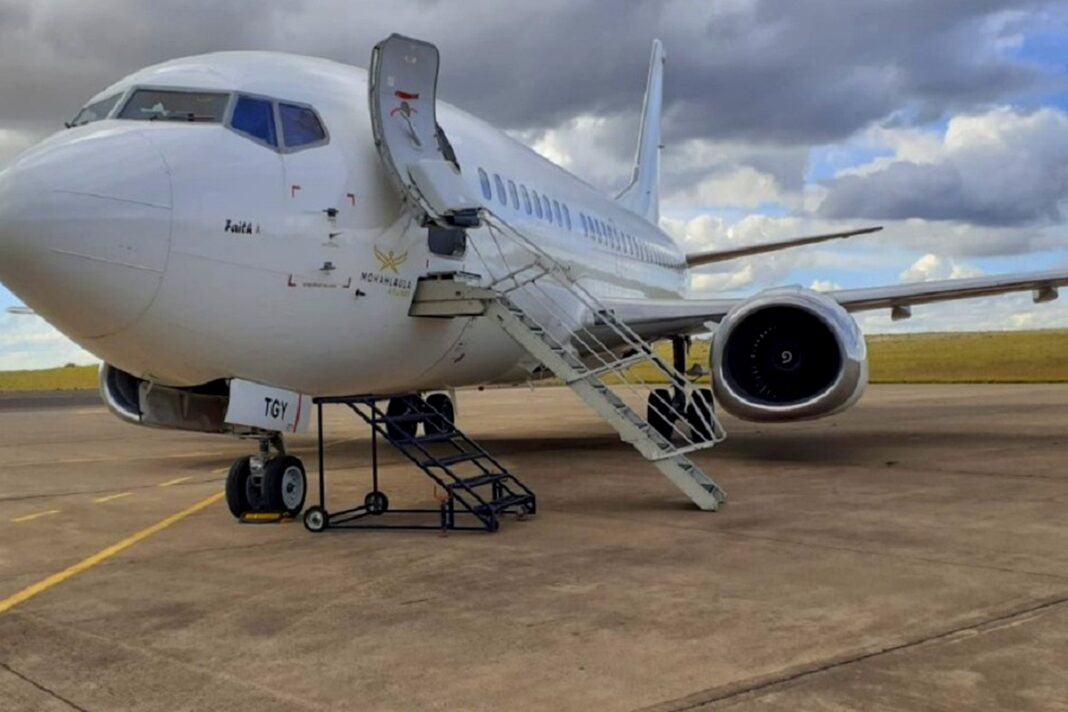Motsamai Mokotjo
The Mines and Minerals Act of 2005, specifically within its clause titled Preference to Lesotho goods and services under Section 11 (1) (c) (ii), stands as a cornerstone in promoting the interests of Basotho-owned businesses.
This particular provision articulates a clear directive: that local enterprises should be given precedence over international counterparts, particularly when they exhibit the capacity to meet specified standards.
The evident contradiction arises, however, as the Ministry of Natural Resources, the governmental body entrusted with overseeing the adherence to such regulations, appears to be impeding the progress of a Mosotho-owned business—Mohahlaula Airlines—even though it has demonstrated its capability to transport diamonds from various mines within the country.
This apparent paradox prompts a critical examination of the motivations underlying the Mines and Minerals Act of 2005 and an exploration into the intricacies of its implementation.
While the Act is crafted with the intent of fostering economic growth and ensuring that the benefits derived from natural resources primarily accrue to African citizens and countries, the observed deviation from its provisions in the case of Mohahlaula Airlines raises questions about the government’s commitment to its own legislative frameworks.
Delving into the broader context, the Act aligns with Agenda 2063, which outlines Africa’s long-term development strategy.
This strategy emphasizes the need to manage natural resources efficiently and effectively, implementing policies, laws, and regulatory frameworks to guide their extraction and utilization for the collective advancement of the continent.
The paradox becomes even more perplexing as the government seemingly flouts a legislative framework designed to protect and promote the interests of its citizens, thus hindering the realization of the goals set forth in Agenda 2063.
The blatant disregard for the Mines and Minerals Act raises concerns about the fidelity of the government to the legislative instruments it has established.
Such actions suggest a disconcerting trend where a faction of politicians may prioritize personal interests over the welfare of Basotho .
This sentiment is underscored by the reference to the Rich Folk Party (RFP), the ruling political entity implicated in this scenario.
Allegations suggest that the RFP is consolidating its members’ interests, particularly in mines where shareholding is predominantly skewed towards associates from Europe and Australia.
The parallels drawn between these actions and the observations made by Karl Marx and Frederick Engels in the Communist Manifesto become stark.
The Manifesto notes, “Such fantastic pictures of future society, painted at a time when the proletariat is still in a very undeveloped state and has but a fantastic conception of its own position, correspond with the first instinctive yearnings of that class for a general reconstruction of society.”
In this instance, it appears that the government’s actions align more with personal gain than the collective advancement of citizens.
The considerable power wielded by politicians, enabling them to amend or revise legislation, including the Mines and Minerals Act, becomes a point of concern.
The awareness that these legislators can manipulate legal frameworks to serve their interests underscores the imperative for citizens to assert their rights and demand the implementation of laws designed to safeguard their welfare.
The minerals extracted from Basotho soil are inherently theirs, and the preference stipulated in the Act is not a mere formality but a rightful claim that citizens should vigilantly pursue.
Expanding on the socio-economic implications, the adverse effects of side-lining Basotho-owned businesses in favor of international entities extend beyond mere economic disparities.
The growth and sustainability of local enterprises play a crucial role in fostering community development, creating employment opportunities, and contributing to the overall socio-economic fabric of the nation.
When the government fails to uphold the principles embedded in its own legislation, it not only undermines the potential for economic growth but also perpetuates a system that favours external interests over the well-being of its own citizens.
In the case of Mohahlaula Airlines, the demonstrated capacity to transport diamonds from various mines in Lesotho positions it as a valuable asset to the local economy.
However, the reluctance of the government to support such enterprises in line with the Mines and Minerals Act raises questions about the overarching economic strategy in place.
It prompts a deeper exploration of whether there are systemic issues hindering the effective implementation of legislation aimed at promoting local businesses and ensuring that the benefits of natural resources remain within the borders of Lesotho.
A historical perspective on mining practices and regulations in the country could shed light on the evolution of legislative frameworks and their impact on local businesses.
Understanding the historical context allows for a nuanced analysis of the challenges faced by the government in aligning its policies with the ever-changing dynamics of the mining industry.
This exploration could provide insights into whether the Mines and Minerals Act of 2005 represents a departure from previous approaches or merely an iteration of existing frameworks.
Engaging with stakeholders, including representatives from Mohahlaula Airlines, the Ministry of Natural Resources, and civil society organizations, can offer a multifaceted understanding of the complexities surrounding the issue. Interviews, surveys, and collaborative discussions can reveal perspectives, concerns, and potential solutions that may not be immediately apparent.
This inclusive approach facilitates a comprehensive analysis that goes beyond the surface-level contradictions and explores the underlying factors contributing to the apparent disregard for the Mines and Minerals Act.
A comparative analysis of how other African nations have successfully implemented similar legislative frameworks can provide valuable insights.
Identifying best practices and learning from the successes and challenges faced by neighbouring countries in promoting local businesses and ensuring the equitable utilization of natural resources can inform recommendations for the country.
This comparative approach acknowledges that the issues surrounding the Mines and Minerals Act are not unique to Lesotho and draws upon the collective experiences of the continent to propose viable solutions.
The international dimension of mining activities in the Kingdom introduces a layer of complexity to the discourse.
Understanding the dynamics of global partnerships, trade agreements, and the influence of external entities on the country’s mining sector is crucial.
Analysing how other nations navigate these complexities while prioritizing the interests of their citizens can provide valuable lessons.
This international perspective contributes to a holistic understanding of the challenges and opportunities inherent in balancing local interests with global dynamics.
In the pursuit of a comprehensive analysis, it is essential to evaluate the role of civil society in holding the government accountable.
Civil society organizations, with their advocacy and watchdog functions, play a pivotal role in ensuring transparency, accountability, and the adherence to legal frameworks.
Examining the involvement of civil society, particularly in relation to the Mines and Minerals Act, sheds light on the effectiveness of these organizations in influencing policy decisions and safeguarding the interests of Basotho.
The media’s role in shaping public discourse and influencing policy decisions cannot be overlooked.
An analysis of media coverage related to the Mines and Minerals Act and the plight of Basotho-owned businesses should provide valuable insights into the narratives shaping public perception and the extent to which media scrutiny influences government actions.
Thus the exploration of the Mines and Minerals Act of 2005, its implementation, and the specific case of Mohahlaula Airlines unveils a complex interplay of legislative intent, economic considerations, and political dynamics.
The contradictions observed within the government’s actions necessitate a multifaceted analysis that goes beyond the surface-level discrepancies.
By delving into the historical context, engaging with stakeholders, considering international perspectives, and evaluating the role of civil society and media, a comprehensive understanding of the challenges and opportunities emerges.
The narrative extends beyond a mere critique of legislative non-compliance; it evolves into a call for a holistic action.
Summary
- The evident contradiction arises, however, as the Ministry of Natural Resources, the governmental body entrusted with overseeing the adherence to such regulations, appears to be impeding the progress of a Mosotho-owned business—Mohahlaula Airlines—even though it has demonstrated its capability to transport diamonds from various mines within the country.
- While the Act is crafted with the intent of fostering economic growth and ensuring that the benefits derived from natural resources primarily accrue to African citizens and countries, the observed deviation from its provisions in the case of Mohahlaula Airlines raises questions about the government’s commitment to its own legislative frameworks.
- The Manifesto notes, “Such fantastic pictures of future society, painted at a time when the proletariat is still in a very undeveloped state and has but a fantastic conception of its own position, correspond with the first instinctive yearnings of that class for a general reconstruction of society.

Your Trusted Source for News and Insights in Lesotho!
At Newsday Media, we are passionate about delivering accurate, timely, and engaging news and multimedia content to our diverse audience. Founded with the vision of revolutionizing the media landscape in Lesotho, we have grown into a leading hybrid media company that blends traditional journalism with innovative digital platforms.









